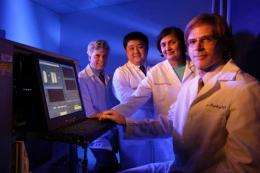Beyond mammography: Handheld laser scanner improves detection and treatment of breast cancer

(PhysOrg.com) -- In 2003, researchers at UC Irvine’s Beckman Laser Institute received a $7 million grant from the National Cancer Institute to standardize use of a laser imaging device they had created for better detection and diagnosis of breast cancer. The investment is beginning to pay off.
In January, the researchers reported in the journal Radiology that this laser breast scanner can accurately distinguish between malignant and benign growths, possibly offering an easy, noninvasive way to tell whether breast tumors warrant aggressive treatment. The study involved 60 subjects and will be replicated with a larger test group.
Developed by Beckman Laser Institute director Bruce Tromberg and assistant researcher Albert Cerussi, the handheld laser breast scanner employs a sophisticated new analysis method devised by UCI biomedical engineering professor Enrico Gratton and graduate student Shwayta Kukreti that produces a spectral “fingerprint” of each patient.
Unlike mammograms, the scanner provides detailed metabolic information by measuring hemoglobin, fat and water content, as well as tumor oxygen consumption and tissue density. In the study, researchers found that potentially dangerous malignant tumors and benign tumors have different metabolic fingerprints.
“The scanning method could improve detection in women with dense breast tissue who don’t do well with mammography,” says UCI surgical oncologist Dr. David Hsiang, who collaborated on the study. “It doesn’t require added contrast agents and can help make diagnosis more exact and treatment more focused.”
Younger women typically have dense breast tissue, and since breast cancer in that demographic is often more deadly, early detection is critical.
Separately, the UCI laser breast scanner is proving beneficial in evaluating the effectiveness of chemotherapy by supplying detailed data on changes in breast tumor metabolism during treatments. This information, which can be accessed quickly at bedside, lets oncologists tailor chemotherapy based on how a patient responds.
“The use of chemotherapy for tumor reduction prior to surgery is important with certain types of breast cancer,” says UCI surgical oncologist Dr. John Butler. “The metabolic fingerprint the scanner provides indicates how the chemotherapy is working and allows doctors to adjust treatments as needed.”
Currently, Beckman Laser Institute researchers are collaborating with colleagues at the University of Pennsylvania, Dartmouth College, UC San Francisco and Massachusetts General Hospital on a planned five-center clinical study of the device’s utility in chemotherapy. (In addition, the Bay Area biotechnology company FirstScan has licensed it for commercial applications.)
“This is a valuable opportunity to standardize our approach and determine - in a national multicenter trial - how this new technology can best enhance treatment and quality of life for breast cancer patients,” Tromberg says.
More information: radiology.rsna.org/content/254/1/277.abstract














